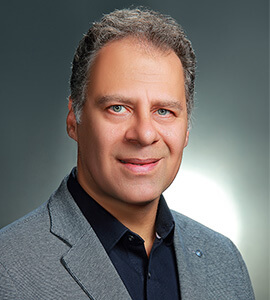
Payam Heydari
Co-ChairSolid-State Circuits Directions
Payam Heydari (M’01, SM’09, F17) received his B.S. and M.S. degrees (Honors) in Electrical Engineering from Sharif University of Technology in 1992 and 1995, respectively. He received his Ph.D. degree from the University of Southern California in 2001. He is currently a Full Professor of Electrical Engineering at the University of California, Irvine. Dr. Heydari’s research covers the design of millimeter-wave, RF, and analog integrated circuits. He is the (co)-author of two books, two book chapters, and more than 150 journal and conference papers. He was a Distinguished Lecturer of the IEEE Solid-State Circuits Society (Jan. 2014 – Jan. 2016) and is now a Distinguished Microwave Lecturer of the IEEE Microwave Theory and Techniques Society (Jan. 2019 – Dec. 2022). His research group was among the first who introduced the design of millimeter-wave integrated circuits in silicon technologies. They demonstrated the first fundamental frequency CMOS end-to-end transceiver operating above 200 GHz.
Dr. Heydari was selected as the inaugural Faculty Innovation Fellow by the University of California, Irvine (UCI) Beall Applied Innovation. Dr. Heydari is a recipient of the 2016-2017 UCI’s School of Engineering Mid-Career Excellence in Research, the 2014 Distinguished Engineering Educator Award from Orange County Engineering Council, the 2009 Business Plan Competition First Place Prize Award and Best Concept Paper Award both from Paul Merage School of Business at UC-Irvine, the 2010 Faculty of the Year Award from UC-Irvine’s Engineering Student Council (ECS), the 2009 School of Engineering Best Faculty Research Award, the 2007 IEEE Circuits and Systems Society Guillemin-Cauer Award, the 2005 IEEE Circuits and Systems Society Darlington Award, the 2005 National Science Foundation (NSF) CAREER Award, the 2005 Henry Samueli School of Engineering Teaching Excellence Award, and the Best Paper Award at the 2000 IEEE Int’l Conference on Computer Design (ICCD). He was recognized as the 2004 Outstanding Faculty in the EECS Department of the University of California, Irvine. His research on novel low-power multi-purpose multi-antenna RF front-ends received the Low-Power Design Contest Award at the 2008 IEEE Int’l Symposium on Low-Power Electronics and Design (ISLPED).
Dr. Heydari currently serves an Associate Editor of both IEEE Journal of Solid-State Circuits and IEEE Solid-State Circuits Letters. He was on the steering committee of the 2020 International Microwave Symposium, and was a member of Technical Program Committee of many conferences including International Solid-State Circuits Conference (ISSCC) and Custom Integrated Circuits Conference (CICC). He was an Associate Editor of IEEE Trans. on Circuits and Systems – Part I. He currently serves on the AdCom of the IEEE Solid-State Circuits Society and a member of Solid-State Circuits Direction (SSCD).
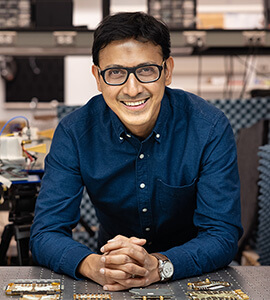
Kaushik Sengupta
Co-ChairSolid-State Circuits Directions
Kaushik Sengupta received the B.Tech. and M.Tech. degrees in electronics and electrical communication engineering from IIT Kharagpur, Kharagpur, India, in 2007, and the M.S. and Ph.D. degrees in electrical engineering from Caltech, Pasadena, CA, USA, in 2008 and 2012, respectively. In 2013, he joined the Department of Electrical and Computer Engineering, Princeton University, Princeton, NJ, USA, as a Faculty Member where he is currently a Professor. He directs the IMRL lab focused on RF-to-THz-to-optical chip-scale systems for wireless and biosensing. He is a recipient of the 2015 Microwave Prize from the IEEE Microwave Theory and Techniques Society, ONR Young Investigator Award the Bell Labs prize in 2017, and DARPA Young Faculty Award and the inaugural Young Alumni Achievement Award from IIT Kharagpur in 2018. He received the E. Lawrence Keys, Jr. Emerson Electric Co. Junior Faculty Award from the Princeton School of Engineering and Applied Science in 2018, and the Excellence in Teaching Award in 2018 nominated by the Undergraduate and Graduate Student Council in the Princeton School of Engineering and Applied Science, Charles Wilts Prize in 2013 from Electrical Engineering, Caltech, for the best Ph.D. thesis, the Caltech Institute Fellowship, and the Prime Minister Gold Medal Award from IIT Kharagpur in 2007. He has previously served as the Chair for Emerging Technologies for IEEE Custom Integrated Circuits Conference (CICC), and currently serves in the International State Circuits Conference (ISSCC) technical program committee. He had served as Distinguished Lecturer for the IEEE Solid-State Circuits Society from 2019 to 2020, and is currently serving as a Distinguished Lecturer for the IEEE Microwave Theory and Techniques from 2021 to 2023. He is a recipient of the Outstanding Young Engineer Award from IEEE Microwave Theory and Techniques in 2021, and the New Frontier Award from IEEE Solid-State Circuits Society in 2022. He is currently serving as a co-chair of the IEEE Solid-State Circuits Directions Committee.
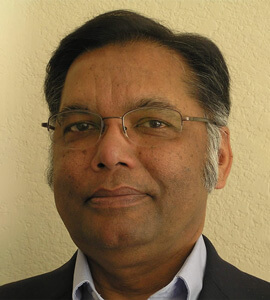
Rakesh Kumar
AdviserSolid-State Circuits Directions
Dr. Rakesh Kumar is a semiconductor industry veteran, an entrepreneur, and an educator. He is the founder, President and CEO of TCX Technology Connexions. Currently he educates and mentors potential engineering entrepreneurs at UCSD. Dr. Kumar has authored the book “Fabless Semiconductor Implementation”, published by McGraw Hill. He is an IEEE Life Fellow and was inducted into the IEEE Technical Activities Hall of Honor in 2018. He is currently Chair of IEEE Roadmaps Committee, Co-Chair of the DataPort Steering committee, a Region 5-6 Governor for the IEEE-HKN honor society, and has been President of the Solid-State Circuits Society (2012-13). He was Vice Program Chair for the 2017 Sections Congress. During 40+ years in the semiconductor industry he has been VP&GM at Cadence Design, and has held various technical and management positions at Unisys and Motorola. He received the Ph.D. M.S. and B.S diplomas in EE in 1974, 1971 and 1969 respectively, and an Executive “MBA” from UCSD in 1989.
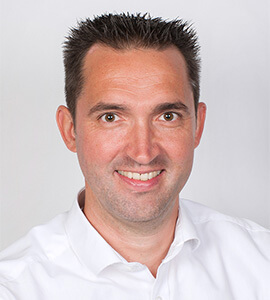
Maurits Ortmanns
Committee MemberSolid-State Circuits Directions
Maurits Ortmanns (M’04–SM’11) received the Dr.-Ing. degree in microsystems engineering from the University of Freiburg, Germany, in 2004. From 2004 – 2005, he has been with sci-worx GmbH, Hannover, Germany, where he was working on implantable electronics. In 2006, he was appointed Assistant Professor for Integrated Interface Circuits at the University of Freiburg. Since 2008, Prof. Ortmanns is full professor at the University of Ulm, where he heads the Institute of Microelectronics. Prof. Ortmanns’ main research interests include mixed-signal integrated circuit design, self-correcting and reconfigurable analog circuits, with special emphasis on data converters and implantable electronics. Prof. Ortmanns received the VDI and the VDE award in 1999, Best Student Paper Awards at MWSCAS 2009, SampTA 2011, BioCAS 2019, the ITG Publication Award 2015, best demo awards at ICECS 2016 and SENSORS 2017, and the faculty teaching awards 2012 and 2015. He served as program committee member of ESSCirC, DATE, ICECS, and ECCTD, as Associate Editor of the IEEE Transactions of Circuits and Systems I and II and as Guest Editor of the IEEE Journal Solid State Circuits. Prof. Ortmanns was a Technical Program and Executive Committee member of the IEEE International Solid-State Circuits Conference (ISSCC) between 2012-2016 and the European Regional Chair of ISSCC 2015. He holds several patents, is author of the book “Continuous-Time Sigma-Delta A/D Conversion” and several other book chapters, and he contributed more than 250 IEEE journal and conference papers.

Firooz Aflatouni
Committee MemberSolid-State Circuits Directions
Firooz Aflatouni received the Ph.D. degree in Electrical Engineering from the University of Southern California, Los Angeles, in 2011. He was a post-doctoral scholar in the Department of Electrical Engineering at the California Institute of Technology before joining the University of Pennsylvania in 2014 where he is an Associate Professor in the Department of Electrical and Systems Engineering. His research interests include electronic-photonic co-design and low power RF and mm-wave integrated circuits. In 1999, he co-founded Pardis Bargh Company where he served as the CTO for five years working on design and manufacturing of inclined-orbit satellite tracking systems.
Firooz received the Bell Labs Prize in 2020, the Young Investigator Program (YIP) Award from the Office of Naval Research in 2019, the NASA Early Stage Innovation Award in 2019, and the 2015 IEEE Benjamin Franklin Key Award. He is a Distinguished Lecturer of the Solid-State Circuit Society and has served on several IEEE program committees (ISSCC, CICC, and IMS). He is an Associate Editor of the IEEE Open Journal of the Solid-State Circuits Society and currently serves as the chair of IEEE Solid State Circuits Society (SSCS) Philadelphia chapter.
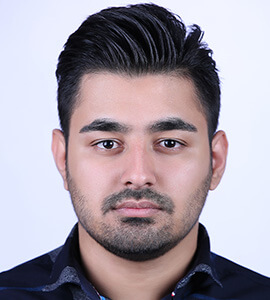
Mahyar Safiallah
Committee MemberSolid-State Circuits Directions
Mahyar Safiallah received his B.Sc. degree in Electrical Engineering from Iran University of Science and Technology (IUST), in 2018 and his M.Sc. degree in Integrated Circuit Design from Sharif University of Technology (SUT), in 2021. Mahyar was a recipient of the UC Irvine EECS departmental fellowship in 2021. He is currently pursuing his Ph.D. degree in Electrical Engineering from UC Irvine. His research interests include ultra-low-power mixed-signal circuit design for biomedical applications.

Rabia Yazicigil
AdviserSolid-State Circuits Directions
Rabia Yazicigil is an Assistant Professor of the ECE Department at Boston University, a Visiting Scholar at MIT, and a Network Faculty at Sabanci University. She was a Postdoctoral Associate at MIT and received her Ph.D. degree from Columbia University in 2016. Her research interests lie at the interface of custom integrated circuits, signal processing, security, bio-sensing, and wireless communications to innovate system-level solutions for future energy-constrained applications. She has received numerous awards, including the Catalyst Foundation Award (2021), the Boston University ENG Dean Catalyst Award (2021), “Electrical Engineering Collaborative Research Award” for her Ph.D. research (2016), second place at the Bell Labs Future X Days Student Research Competition (2015), and 2014 Millman Teaching Assistant Award of Columbia University. She served as the Vice Chair of the Rising Stars 2020 workshop at the IEEE International Solid-State Circuits Conference (ISSCC) and is a member of the 2015 MIT EECS Rising Stars cohort. In 2021-2022, she served as a Guest Associate Editor of the IEEE Journal of Solid-State Circuits for the European Solid-State Circuits Conference (ESSCIRC) Special Issue. Dr. Yazicigil recently presented a lecture at the IEEE ISSCC 2023 Circuit Insights event and delivered a tutorial on physical-layer security for latency- and energy-constrained integrated systems at the IEEE ISSCC 2023. She serves as an Associate Editor of the IEEE Transactions on Circuits and Systems-I (TCAS-I) and on the IEEE Council for RFID Advisory Committee as a Solid-State Circuits Society (SSCS) representative. Dr. Yazicigil is a senior member of IEEE and an active member of the SSCS Women-in-Circuits committee (2016-present). Lastly, she is a Technical Program Committee member of the IEEE ISSCC (2019-present), ESSCIRC (2019-present), International Electron Devices Meeting (2021), and Radio-Frequency Integrated Circuits (RFIC) Symposium (2023-present).
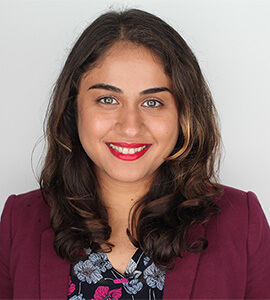
Shirin Mintazeri
Committee MemberSolid-State Directions
Shirin Montazeri received her Ph.D. degree in Electrical Engineering from the University of Massachusetts Amherst, in 2018. During her PhD, she was a research assistant working on low-power LNAs, RF transceivers, device modeling, and MMIC designs for radio astronomy and quantum computers. She was a recipient of the 2016 Microwave Theory and Techniques Graduate Fellowship award and the 2019 Best PhD Dissertation award. In 2018, she joined Qualcomm Technologies where she worked on the 4G/5G transceiver chips. Currently, She is a researcher at Google Quantum AI team working on the RF/microwave integrated circuits and systems for control and readout of quantum computers. Shirin is also serving as the 2023-2025 vice-chair of the MTT-S Low Noise Techniques Technical Committee and was the co-chair of the Women in Microwave (WiM) Engineering committee at the 2023 International Microwave Symposium.

Atsutake Kosuge
Committee MemberSolid-State Directions
Atsutake Kosuge (S’12–M’16) received the B.S., M.S., and Ph.D. degrees in electrical engineering from Keio University, Yokohama, Japan, in 2012, 2014, and 2016, respectively. From 2014 to 2017, he was a JSPS Research Fellow at Keio University. From 2017 to 2020, he held research positions at Hitachi Ltd. and Sony Corporation. In 2021, he joined The University of Tokyo. He is currently an Assistant Professor of Systems Design Lab (d.lab) and a senior researcher of Research Association for Advanced Systems (RaaS). His research interests include energy-efficient computing, computational sensing, and 3-D integration technologies. He invented the digital neuromorphic processor which mimics the various kinds of nonlinear functions of dendrite spines in the human cerebrum to reduce area and power consumption of AI processing. He published more than 60 international journal and conference papers. Dr. Kosuge has served as a member of the Technical Program Committee of IEEE A-SSCC (Asian Solid-State Circuits Conference) from 2021, IEICE ICD (Integrated Circuit and Devices), and served as a member for the Organizing Committee of IEEE COOL Chips (Symposium on Low-Power and High-Speed Chips and Systems). He received the 2013 Nikkei Electronics Japan Wireless Technology Best Award, 2020 IEICE Young Researcher’s Award, 2021 MIT Technology Review Japan Innovators Under 35 Award, and co-recipient of the ASP-DAC’15 Special Feature Award.
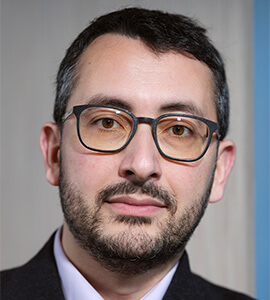
Fabio Sebastiano
Committee MemberSolid-State Directions
Fabio Sebastiano (S’09-M’10-SM’17) received the B.Sc. (cum laude) and M.Sc. (cum laude) degrees in electrical engineering from University of Pisa, Italy, in 2003 and 2005, respectively, the M.Sc. degree (cum laude) from Sant’Anna school of Advanced Studies, Pisa, Italy, in 2006 and the Ph.D. degree from Delft University of Technology, The Netherlands, in 2011.
From 2006 to 2013, he was with NXP Semiconductors Research in Eindhoven, The Netherlands, where he conducted research on fully integrated CMOS frequency references, nanometer temperature sensors, and area-efficient interfaces for magnetic sensors. In 2013, he joined Delft University of Technology, where he is currently an Associate Professor and the Research Lead of the Quantum Computing Division of QuTech. He has authored or co-authored one book, 11 patents, and over 100 technical publications. His main research interests are cryogenic electronics, quantum computing, sensor read-outs, and fully integrated frequency references.
Dr. Sebastiano is on the technical program committee of the ISSCC, and the IEEE RFIC Symposium, and has been on the program committee of IMS. He is currently serving as an Associate Editor of the IEEE Transactions on VLSI, and has also served as a Guest Editor of the JSSC. He was co-recipient of the 2008 ISCAS Best Student Paper Award, the 2017 DATE best IP award, the ISSCC 2020 Jan van Vessem Award for Outstanding European Paper, and the 2022 IEEE CICC Best Paper Award. He has served as Distinguished Lecturer of the IEEE Solid-State Circuit Society.



